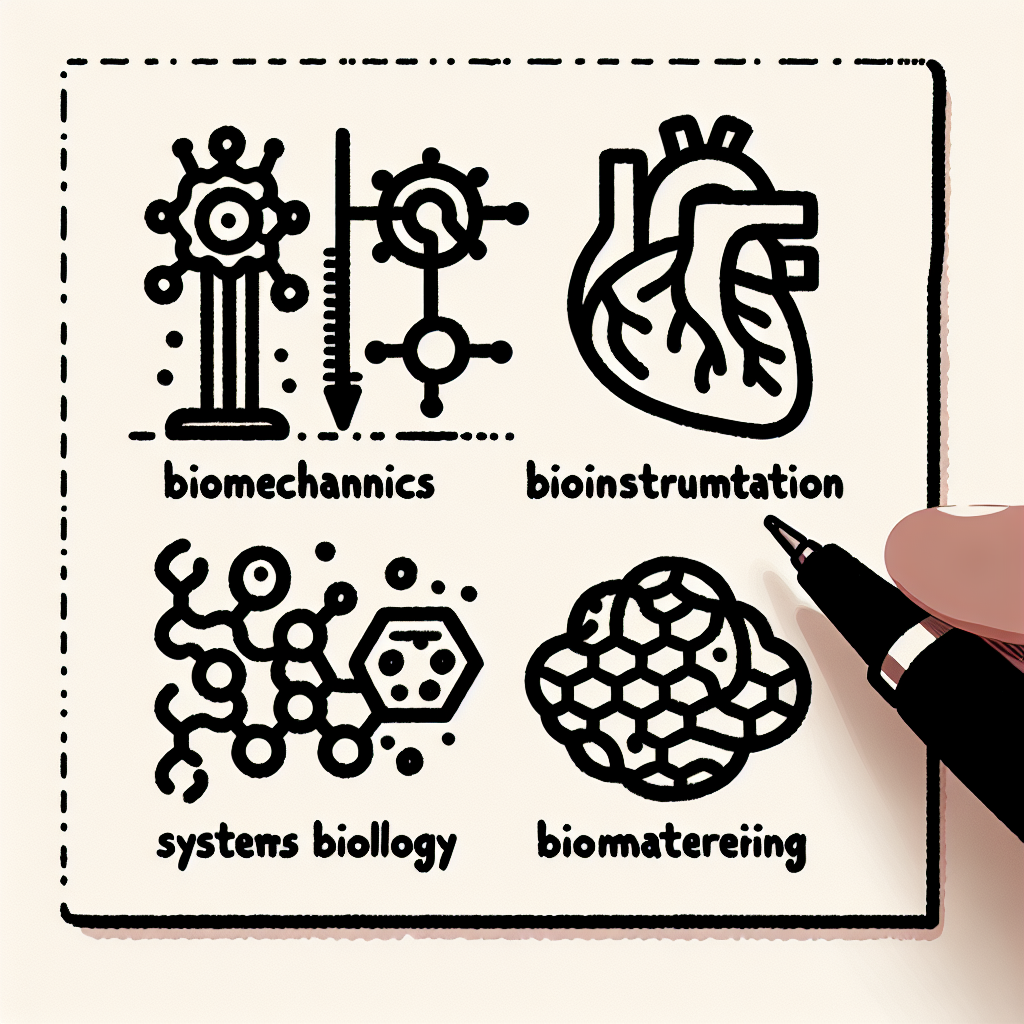Introduction to Biomedical Engineering
Biomedical engineering is a multidisciplinary field that applies principles from engineering, biology, and medicine to develop technologies and devices that improve healthcare. It encompasses a wide range of applications, from designing medical imaging systems and prosthetics to developing biomaterials and regenerative therapies.
The scope of biomedical engineering extends across healthcare, research, and technology. It plays a critical role in advancing medical treatments, enhancing diagnostic tools, and creating innovative devices that support patient care. Biomedical engineers contribute to the development of life-saving technologies such as pacemakers, artificial organs, and robotic surgical systems.
This field is essential to modern healthcare, driving innovation in medical diagnostics, personalized medicine, and biocompatible prosthetics. It also supports research efforts that lead to breakthroughs in disease detection, drug delivery systems, and tissue engineering.
Graduates from the best schools for biomedical engineering can pursue diverse career paths. Common industries include medical device manufacturing, biotechnology, pharmaceuticals, hospitals, and academic or government research institutions. Roles may range from design engineers and clinical engineers to research scientists and regulatory affairs specialists. Biomedical engineering also provides a strong foundation for advanced studies in medicine, dentistry, or graduate-level engineering programs.

📊 Understanding Rankings and Why They Matter
Methodologies Behind the Rankings
When evaluating the best schools for biomedical engineering, rankings can serve as a starting point to compare programs. U.S. News & World Report is one of the most widely referenced sources for college and graduate program rankings. Their methodology typically includes several key factors:
- Peer assessments: Surveys from academic officials help gauge the reputation of a program within the academic community.
- Research activity: This includes total research expenditures and the number of research projects, which reflect a program’s commitment to advancing biomedical engineering knowledge.
- Faculty credentials: The qualifications and accomplishments of faculty members influence the academic quality of a program.
- Industry partnerships: Collaborations with healthcare and technology companies can enhance student opportunities for internships and employment.
Beyond U.S. News, other rankings may incorporate different metrics such as:
- Student outcomes: Graduation rates, employment statistics, and alumni success.
- Diversity: Representation and support for underrepresented groups.
- Innovation: Patents, startups, and the integration of emerging technologies.
- Facilities: Access to modern labs, equipment, and research centers.
Why Rankings Should Be One of Many Considerations
While rankings provide useful insights, they should not be the sole factor in choosing the best schools for biomedical engineering. High rankings often reflect prestige, but they may not align with an individual student's goals or learning style.
Prestige vs. program fit is a critical distinction. A top-ranked school may have a strong reputation but might not offer the specific research focus or learning environment a student seeks.
There are also limitations to rankings. They may not capture the nuances of mentorship, campus culture, or the quality of undergraduate teaching. Moreover, methodologies can vary significantly between ranking organizations, leading to inconsistent results.
To gain a fuller understanding of a program, it's important to visit campuses, speak with faculty and current students, and review the curriculum and research opportunities. These steps help assess whether a school’s biomedical engineering program aligns with personal academic and professional goals.

🏆 Top Biomedical Engineering Programs in the U.S.
When evaluating the best schools for biomedical engineering, several institutions consistently stand out due to their academic excellence, research output, and industry connections.
1. Johns Hopkins University
Johns Hopkins University is widely recognized as one of the best schools for biomedical engineering. It consistently ranks #1 in U.S. News & World Report's graduate biomedical engineering rankings. The university places a strong emphasis on translational research and benefits from close clinical partnerships with the Johns Hopkins Hospital. It is also home to the Whitaker Biomedical Engineering Institute, which fosters innovation at the intersection of engineering and medicine. Source
2. Georgia Institute of Technology
Georgia Tech is known for its interdisciplinary education and cutting-edge biomedical research. The program offers robust co-op and internship opportunities with leading biotech firms, making it one of the best schools for biomedical engineering in terms of hands-on experience and industry readiness. Source
3. University of California, San Diego – Jacobs School of Engineering
UC San Diego's Jacobs School of Engineering has maintained a strong reputation since establishing its Department of Bioengineering in 1994. As one of the best schools for biomedical engineering, it offers comprehensive undergraduate and graduate programs and emphasizes interdisciplinary research and innovation. UCSD Wikipedia
4. Purdue University College of Engineering
Purdue University is another top contender among the best schools for biomedical engineering. It is ranked 23rd for undergraduate and 29th for graduate biomedical engineering programs. Purdue is known for its excellent research infrastructure and strong collaborations with industry partners. Purdue Wikipedia
5. Vanderbilt University School of Engineering
Vanderbilt University's biomedical engineering program ranks 20th nationally and is considered one of the best schools for biomedical engineering. The program focuses on areas such as medical imaging, rehabilitation engineering, and surgical robotics, offering a well-rounded curriculum and research opportunities. Vanderbilt Wikipedia
6. University of Utah College of Engineering
The University of Utah ranks 34th in graduate biomedical engineering programs and is recognized for its strong connections to research hospitals and medical device companies. These industry ties contribute to its reputation as one of the best schools for biomedical engineering. Utah Wikipedia

🔍 Key Features That Set Top Programs Apart
When evaluating the best schools for biomedical engineering, several defining features consistently distinguish top-tier programs. These characteristics ensure that students receive a robust education and are well-prepared for careers in academia, industry, or healthcare.
Faculty Excellence
Leading biomedical engineering programs are staffed by faculty members who are not only accomplished researchers but also influential figures in the scientific community. Many professors hold prestigious honors such as membership in the National Academy of Engineering or have been awarded Nobel Prizes. In addition to academic accolades, these faculty often bring real-world experience from biotech companies and healthcare institutions, providing students with practical insights and mentorship.
Research Infrastructure
Top schools invest heavily in cutting-edge research facilities. Students have access to advanced laboratories equipped with state-of-the-art instruments for tissue engineering, biomedical imaging, and molecular biology. Undergraduate students in these programs often engage in hands-on research early in their academic careers, contributing to meaningful projects alongside graduate students and faculty.
Industry and Clinical Partnerships
Strong connections with hospitals, medical schools, and biotech firms are a hallmark of the best biomedical engineering programs. These collaborations lead to joint research initiatives, clinical trials, and technology development. Students benefit from internship and co-op opportunities that provide real-world experience and enhance employability upon graduation.
Interdisciplinary Learning
Biomedical engineering sits at the intersection of multiple disciplines. The top programs offer curricula that integrate biology, engineering, and computer science, enabling students to tackle complex healthcare problems from multiple angles. Many schools also allow flexibility to pursue minors or dual degrees in related fields such as data science or business, broadening career prospects and fostering innovation.

Specialized Focus Areas in Biomedical Engineering
When exploring the best schools for biomedical engineering, it's important to understand the various specialized focus areas within the field. These concentrations allow students to tailor their education to match specific interests and career goals.
Biomechanics
Biomechanics applies principles of mechanics to understand how biological systems function. It includes the study of motion, material properties of biological tissues, and the development of prosthetics and orthotics. Top programs often offer research opportunities in human movement analysis and orthopedic device design.
Biomaterials
Biomaterials involve the development and study of materials compatible with biological systems. This focus area is essential for designing implants, drug delivery systems, and tissue scaffolds. The best schools for biomedical engineering typically have strong interdisciplinary labs that collaborate with materials science and chemistry departments.
Bioinstrumentation
Bioinstrumentation focuses on the design of devices and tools for diagnosing and treating medical conditions. This includes wearable sensors, diagnostic machines, and patient monitoring systems. Schools with advanced engineering facilities often provide hands-on experience with real-world clinical instrumentation.
Medical Imaging
Medical imaging covers the technologies used to visualize the interior of the body, such as MRI, CT, and ultrasound. Programs strong in this area often integrate coursework in signal processing and computer vision. Research centers in the best schools for biomedical engineering may collaborate with hospitals to develop next-generation imaging techniques.
Tissue Engineering
Tissue engineering combines biology and engineering to create biological substitutes that restore or improve tissue function. It often overlaps with regenerative medicine. Leading programs offer research in stem cell biology, scaffold design, and bioreactor systems.
Neural Engineering
Neural engineering focuses on the interface between the nervous system and artificial devices. Applications include brain-computer interfaces and neuroprosthetics. The best schools for biomedical engineering often support interdisciplinary research in neuroscience, electrical engineering, and computer science to advance this field.
Systems Biology
Systems biology uses computational and mathematical modeling to understand complex biological systems. It is crucial for drug development and understanding disease mechanisms. Top programs typically offer access to high-performance computing resources and collaborations with genomics and bioinformatics departments.
Understanding these specialized areas helps students choose the best schools for biomedical engineering based on their academic and career interests.

Choosing the Right Program for You
When searching for the best schools for biomedical engineering, it’s important to go beyond rankings and consider how well each program aligns with your personal and professional goals.
Aligning Career Goals with Program Strengths
Some biomedical engineering programs emphasize research and are ideal for students planning to pursue graduate school or careers in academia. These programs typically offer access to cutting-edge laboratories, faculty-led research projects, and opportunities for publishing scholarly work. Others are structured with an industry focus, providing hands-on experience, internships, and coursework tailored to immediate employment in medical device companies, biotech firms, or hospitals.
Understanding whether a school prioritizes research or industry engagement will help you select the best program for your aspirations.
Evaluating Program Fit
The learning environment plays a significant role in your educational experience. Smaller class sizes and low faculty-student ratios often mean more individualized attention and mentorship opportunities. Assessing campus culture and the level of student support can help determine whether a program will provide a collaborative and inclusive atmosphere.
Financial considerations also matter. Investigate the availability of scholarships, fellowships, and assistantships, especially if you’re planning to attend graduate school. These resources can significantly offset tuition costs and reduce student debt.
Beyond the Rankings
While rankings can offer a general sense of a program’s reputation, other metrics are equally important. A strong alumni network can provide mentorship, networking opportunities, and job leads. Reviewing job placement rates and typical career outcomes for graduates will give you a clearer picture of a program’s effectiveness in preparing students for success.
Additionally, don’t overlook practical factors like location and cost of living. Attending one of the best schools for biomedical engineering in an affordable city can ease financial strain and improve your overall quality of life while studying.

Career Outlook After Biomedical Engineering
Graduates from the best schools for biomedical engineering can expect a strong career outlook with competitive salaries and growing job opportunities. According to the U.S. Bureau of Labor Statistics (BLS), the median annual wage for biomedical engineers was $97,410 in 2021, with the top 10% earning more than $154,750. The field is projected to grow by 10% from 2021 to 2031, faster than the average for all occupations.
Biomedical engineers are in demand across a range of industries, including medical device manufacturing, pharmaceutical companies, hospitals, and research institutions. Emerging areas like biotechnology, rehabilitation engineering, and wearable medical technology are also expanding the need for skilled professionals.
A graduate degree can significantly enhance career prospects. Many advanced roles in research, product development, and academia require a master’s or Ph.D. in biomedical engineering or a related field. Additionally, certifications such as those offered by the American College of Clinical Engineering (ACCE) can provide a competitive edge in specialized roles.
Graduates from the best schools for biomedical engineering often have access to robust alumni networks, internship opportunities, and partnerships with healthcare organizations, all of which can facilitate a smoother transition into the workforce.

Final Thoughts and Recommendations
When exploring the best schools for biomedical engineering, it's important to treat rankings as a helpful starting point rather than the sole factor in your decision-making process. While rankings can offer an overview of academic reputation and research output, they may not reflect your individual priorities or learning style.
Focus on programs that align closely with your personal interests, whether that’s medical imaging, biomechanics, or tissue engineering. Consider the faculty's research areas, available lab facilities, and opportunities for interdisciplinary collaboration. These factors can significantly impact your educational experience and future career prospects.
Talking to current students and alumni can offer valuable, firsthand perspectives on what it’s like to study biomedical engineering at a particular school. They can provide insight into the academic environment, internship opportunities, and support networks that you won’t find in brochures or rankings.
By combining objective data with personal exploration, you’ll be better equipped to choose the best school for biomedical engineering that fits your goals and aspirations.

📚 Citations & Further Reading
For those seeking more information on the best schools for biomedical engineering, the following sources offer detailed insights and rankings:
- U.S. News & World Report Rankings – A comprehensive list ranking the best schools for biomedical engineering based on peer assessments, research activity, and faculty credentials.
- UC San Diego Jacobs School of Engineering – An overview of one of the top institutions known for its strengths in bioengineering and interdisciplinary research.
- Vanderbilt University School of Engineering – Details on Vanderbilt’s engineering programs, including its focus areas and research strengths in biomedical fields.
- University of Utah College of Engineering – Information about the university’s contributions to biomedical engineering, including its historical role in medical device innovation.
- Purdue University College of Engineering – A look into Purdue’s engineering programs, highlighting its research initiatives and commitment to biomedical innovation.







.png)






